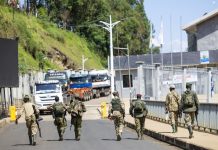Africa-Press – Rwanda. Rwanda’s economy continues to show resilience despite a challenging global environment, according to the International Monetary Fund (IMF), which noted steady growth, contained inflation, and progress in structural reforms under its three-year Policy Coordination Instrument (PCI).
From September 29 through October 10, an IMF mission led by Albert Touna Mama held discussions in Kigali with government officials on the sixth and final review of the PCI.
The IMF Executive Board is expected to consider the review in December 2025.
According to the mission’s findings, Rwanda’s economy grew by 7.2 per cent in 2024 and maintained the same pace in the first half of 2025, driven by services, construction, and coffee exports.
Inflation rates also remained within the National Bank of Rwanda’s (BNR) target range of 2 per centto 8 per cent.
However, the current account deficit widened in early 2025 due to higher imports of consumer and capital goods, which offset a stronger export performance.
Findings also indicated that the Rwandan franc depreciated by around 3 per cent against the US dollar through June 2025, while international reserves covered 4.8 months of imports — providing a cushion against external shocks.
“Despite facing consecutive shocks, Rwanda’s economy continues to demonstrate strength and resilience,” said Touna Mama. “Macroeconomic policy performance through end-June 2025 remained in line with programme objectives under the PCI.
He added, “All quantitative targets were met, and the completion of this final review will mark the successful conclusion of a programme that has helped anchor macroeconomic stability and advance key structural reforms.”
The IMF noted that the outlook for Rwanda remains positive, with growth expected to stay strong and inflation contained.
But, it cautioned that risks are tilted to the downside, pointing to volatile global commodity prices, weak external demand, and tighter global financing conditions.
At the same time, the Fund warned that recurrent shocks and the financing of large infrastructure projects have challenged efforts to rebuild fiscal buffers.
For example, the IMF forecasts that borrowing for the New Kigali International Airport, under construction in Bugesera District, is projected to push public debt close to 80 per cent of GDP by 2027.
Tax reforms to boost revenues
The Fund stated that the full implementation of the new tax package will help boost domestic revenues and reinforce debt sustainability. It also advised the government to maintain fiscal consolidation through careful expenditure control and continued prioritisation of projects.
The Minister of State for National Treasury, Godfrey Kabera, maintained that “This partnership with the IMF has provided a valuable roadmap for our economic policy. By focusing on raising our own revenues, spending wisely, and strengthening our institutions, we have built a more resilient economy. As we complete this program, our focus remains on ensuring that our growth is strong and inclusive.”
Monetary policy, the IMF pointed out, should remain proactive and data-driven to keep inflation within target, while exchange rate flexibility should help manage imbalances and support export competitiveness.
IMF’s Touna Mama also emphasised the importance of continued structural reforms to promote inclusive and durable growth, including building resilience to climate shocks and deepening regional integration to boost exports.
He commended efforts by the government of Rwanda as the PCI concludes, citing that the Fund remains committed to supporting the country’s reform and development agenda.
The PCI, which does not involve financial disbursements, serves as a framework for countries to demonstrate commitment to sound economic management while receiving IMF policy support and guidance.
For More News And Analysis About Rwanda Follow Africa-Press






